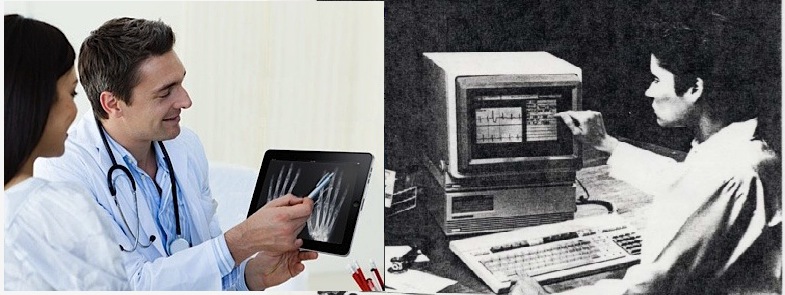"Tablet" from the iPad. Why doctors don't need an iPad

Working as a doctor and being turned on new technologies, I enthusiastically accepted the news about the appearance of tablets.
“Class! I thought, after all, medicine has always adopted the most advanced technologies and solutions!
Indeed, IBM, along with its first computer “IBM 701”, produced heart-lung machines in the fifties , and the first mainframe programs analyzed ECG . In the eighties, doctors got personal computers and computed tomographs, in the nineties - in vitro fertilization technologies, in the two thousandths - a medical robot .
Naturally, the appearance of the iPad caused a real sensation .
News feeds are full of pictures from the near future, where every district doctor has a magical iPad. Domestic IT companies are in full swing developing medical iPad applications .
Even the President fell victim to new items from Cupertino!
Why is everything in reality not so rosy?
Why will tablets be ordered into mass medicine for a long time (years, maybe a decade)?
I will try to answer this question.
First, the first “progressive" impression of healthcare is misleading: in fact, medicine is one of the most conservative areas of activity. Many years pass from the appearance of a novelty to its mass introduction.
The inertia of the system is enormous. For example, more than twenty years have passed from the first successful diagnostic laparoscopy to its mass introduction . Or in vitro fertilization - the first child was born in 1978, but this technology became widespread in the 21st century.
And this is not (only) in Russia.
Secondly, the iPad ... is inconvenient for the doctor and nurse in their practice!
iPad:
- 1. Do not put in your pocket
- 2. “Turns off” one or both hands from work: it must be constantly put or removed somewhere to examine the patient, any manipulation. Do not hang it around the neck!
- 3. Fragile, does not even withstand falling to the floor.
- 4. Has a small and dirt-, water-, blood- and purulent-protection.
- 5. Not sterile, not sterilized (because of the capacitive screen, even covers are difficult to use)
- 6. It is impossible to make handwritten notes on it, and entering text at the patient’s bed with one finger is slow and uncomfortable
- 7. iPad - a personalized device attached to the doctor (like a mobile phone), which makes it “non-transferable” (nontransferable), while the medical history is “attached” to the patient, and it can easily be given to a nurse or consultant.
- 8. He is dear. Compared to paper and pen - hundreds of times.
In my opinion, the main problem is that the tablet is primarily a device for consuming information, and it lacks interfaces for its quick and convenient input.
I would also mention a number of organizational reasons that impede the promotion of tablets:
- 1. Heads of institutions, doctors of the "old" school sometimes do not even have a good mobile phone
- 2. Even in the USA, 90% of hospitals have NO electronic document management systems ; doctors prefer paper. Moreover, a full-fledged electronic document management system is present only in 1.5% of hospitals !!! ( Status for 2009 )
- 3. At this stage, there is a whole “zoo” of IT systems in hospitals, consisting of “chimeras” (especially in Russia)
- 4. Naturally, in most hospitals, the electronic document management systems used are not designed for tablets, because ...
- 5. ... There are no standard iPad software solutions compatible with hospital systems
- 6. Few places where there is a hospital WIFI network
- 7. Security problems, lack of professionalism of IT units in medical institutions (where they exist)
- 8. Unrealized conflicts in the legislation - “a computer is not a document, a document is a medical history”
So what is the fate of the iPad and tablets in healthcare?
My opinion is optimistic: over time, the tablets will take on many of the functions that stationary computers currently perform, especially paramedical ones:
- - work with the schedule of admission of patients / operations,
- - planning
- - control of appointments,
- - access to medical literature and periodicals
- - “illustrated” conversations with patients
- - discussion of interesting finds ( what do you think this thing is in the picture? ), Etc.
As for medicine itself, something more must happen than just the appearance of tablets. There will be many small steps. A quiet revolution will take place in the interfaces of medical devices so that they become intuitive, voice input devices will gradually appear, touch panels will become cheaper and more habitual, reliable wireless technologies will connect all devices, from an MRI scanner to a bedside monitor, into a single secure network, and bind all information to a specific patient.
And then the tablet will become a convenient assistant to the doctor.
But all this will come true oh how soon.
PS I hope for an interesting discussion in the comments!
